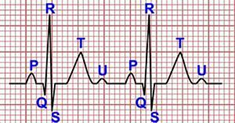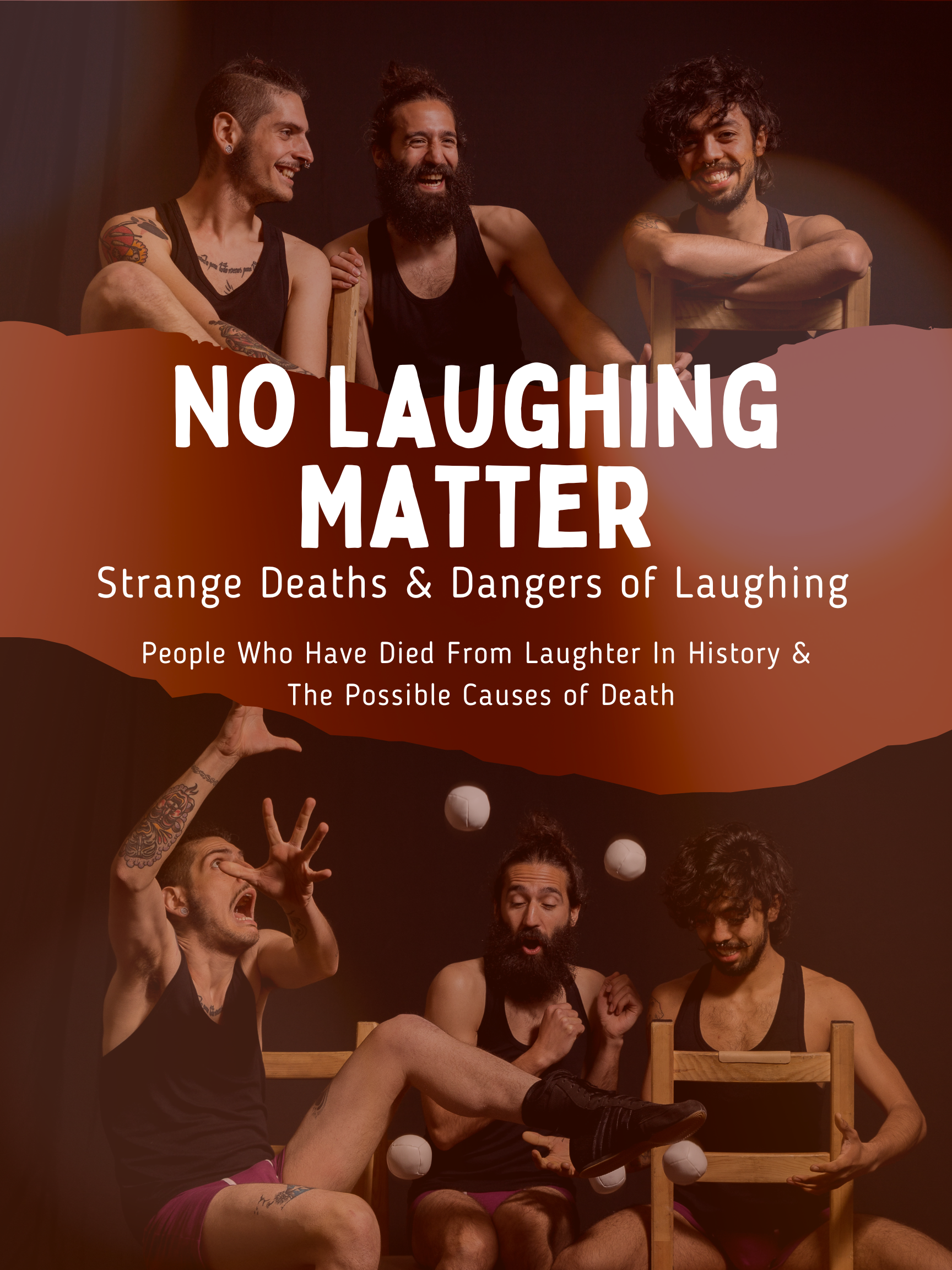
Many people are fascinated by the dark and macabre. Whether it is horror shows, real-life survival stories, serial killers, ghost stories, or anything having to do with death, it really captures the attention of the public. There are a plethora of movies, tv shows, and books written on everything strange and unusual. In this series, we will discuss the stranger ways in which people have died. One of the ways that immediately captured my attention was death by laughter! There was no way this was a thing, right? So, many, many, many (you get the point) hours later, I came to an interesting conclusion. The truth is yes and no. Let me explain. So, yes people have died while laughing, but most of these people had underlying health conditions that made them susceptible to death. Their death could have been caused by any strenuous event, whether it is from shoveling snow or chasing after the family dog. I’m sure that you can recall news articles about star athletes who collapse suddenly and die. It turns out it is similar to those types of events. So, before you stop streaming those Sitcom’s or watching those romantic-comedies, let’s look at a few of the facts…
An article in the British Medical Journal (BMJ) in December 2013, looked at the benefits and dangers of laughter. The research was conducted by the University of Birmingham and Oxford University, they looked at nearly seven decades of scientific literature. According to the article, there has been a single case that was shown to have been CAUSED by laughter. This event was recorded in the Annals of Internal Medicine, in which they talk about the 50-year-old schizophrenic woman, who had a history of heart problems. “She had intense, sustained laughter one day after hearing a joke, [she] collapsed and could not be revived.”
What could make laughter so dangerous? Well, first of all, we need to define what we are talking about because apparently there are different types of laughter. There is Pathologic, Homeric (aka Belly Laughter), and Contagious Laughter. Let’s talk a little about each.
Pathologic Laughter – This is laughter that you have no control of, even happening when you do not feel the same emotionally. In these cases, there is something physically wrong with your brain. (This category includes Pseudobulber Affect (PBA) or Pathologic Laughter and Crying (PLC). This usually happens in people with a brain injury or certain neurologic conditions. Just to show how prevalent this is, according to PBAinfo.org, there are nearly 2 million people in the U.S. that have been diagnosed with this, and an additional 7 million that have conditions that suggest they have some form of PBA. Some other causes of unusual and uncontrollable laughter include: epileptic gelastic seizures, cerebral tumors, strokes, multiple sclerosis, and motor neuron disease. Also, infarction (tissue dying due to loss of blood supply) to the pons and medulla oblongata, and/or lesions to the hypothalamus are some other things that can contribute to this unusual pathology.

Benign / Homeric / Duchenne Laughter — (aka Belly Laughter) This is genuine laughter. While it is sometimes uncontrolled it is mostly benign. This is loud, boisterous, and prolonged/sustained laughter, “characterized by contraction of both the zygomatic and the orbicularis oculi muscles.” (See photo) This is a fancy way of saying when you genuinely laugh, or even smile, it reaches your eyes. If you were to “social” smile to be polite, it only uses the muscles right around the mouth. According to the Journal of Experimental Psychology, your brain releases certain chemicals (i.e., dopamine, serotonin, and endorphins) when you smile/laugh, which can help improve your mood. There are differing opinions about social smiling/laughing. Some academics insist that if you give a social smile, your brain doesn’t release these chemicals, that your brain knows the difference. While just as many experimenters are on the opposite side, saying that it doesn’t matter what kind of smile you have, your brain releases the chemicals either way.
Contagious Laughter — This is a condition that is studied, but not yet understood. Some behaviors that we have as humans can be very contagious. This includes yawning, smiling, and laughing, just to name a few. This is a complex and interesting topic, so I have decided to make a “Behavioral Contagion” post of its own, so look out for this topic in the future.
Some General Benefits (not an all-inclusive list):
There are many sites, papers, studies, and research done on the benefits of laughter. In fact, MOST research done on laughter has been on the benefits of it. It is known that laughter has numerous health benefits, which include:
- Decreases Stress
- Stimulates Circulation
- Eases Tension and Helps Your Muscles Relax
- Boosts Your Intake of Oxygen Rich Air
- Decreases Depression
- Decreases Anxiety
- Strengthens Your Immune System and Lessen the Risk of Illness
- Improves Your Mood
- Helps to Relieve Pain
People Throughout History Who Have Died Due to Laughter
There have been cases throughout history of people dying from laughter. From ancient Greece and into modern times, laughing has been deadly. It is sometimes very difficult to determine a person’s actual cause of death, especially as you go further back in history. Even today’s pathologists sometimes get it wrong. Here are some people in history who were recorded to have died from laughter:

Calchas – 12th Century B.C. – Greek Soothsayer – Said to be the wisest soothsayer of his time, giving counsel to Greece during the Trojan War. In fact, it is said that it was he who advised them to build the famous wooden Trojan horse. There are actually two stories recorded about his death. Story 1: (The more popular tale) – One day Calchas was tending to his grapevines when a fellow soothsayer approached him. The man said he had foreseen that Calchas would never drink the wine produced from the grapes that he was planting. So, when the grapes were ready and harvested, wine was made from those grapes. Calchas was feeling superior that the other soothsayer was obviously wrong in his prediction. So, after the wine was made, Calchas invited the seer to a feast, where he could taunt him about his wrong prediction. At the dinner, Calchas held a goblet of wine in his hand and began to scoff at the other man. However, the other soothsayer simply repeated the prophecy, that he would never taste the wine. This incited such laughter from Calchas that he began to choke, and he ended up dying before he could taste the wine. Story 2: Calchas lost a soothsaying match with another soothsayer. This extreme grief caused him to pass away. Whichever story you believe, it is clear Calchas had a very big ego and couldn’t believe that he could possibly be wrong, or worse another soothsayer could possibly be right!

Zeuxis – 5th Century B.C. – Greek painter – It is said that Zeuxis was commissioned to paint a portrait of the goddess Aphrodite. However, the older woman who hired him insisted that she be the one who posed for him. After completing the painting, he saw his unflattering work and laughed so hard that he collapsed and died. Some even suggested that he died because the gods/goddesses were so offended by the portrait.

Chrysippus – 3rd Century B.C. – Greek Stoic Philosopher – After giving wine to his donkey, the animal became very inebriated. In a stumbling stupor, the donkey tried to eat some of Chrysippus’ figs. Watching his drunk donkey, he laughed at the whimsical sight. He laughed so hard that he ended up dying. (Note: There is also a story, written by Diogenes Laertius, a biographer of the Greek philosophers, who lived in the same era. Diogenes wrote that he believed that Chrysippus actually died of alcohol poisoning, by drinking too much-undiluted wine.)
Philemon – c. 362 – 262 B.C. – Greek Poet and Writer – While writing a play (a comedy), Philemon made a joke that sent him into a fit of laughter. He laughed so hard that he passed away shortly afterward.

King Martin of Aragon – 1356 – 1410 – There are different stories as to how the king died. The one related to what we are talking about is an event that is recorded, but is lacking in evidence. The king had indigestion at dinner one evening. While eating, his favorite court jester, Borra, was entertaining him and told King Martin a joke. The king started laughing so much that it led to his death.

Pietro Aretino – 1492 – 1556 – Italian Author – While sitting around talking, Pietro’s sister was telling him a very funny story. He began to laugh so hard that he fell backwards out of his chair and lost consciousness. He could not be revived and ended up passing away.

Sir Thomas Urquhart – 1611 – 1660 – Scottish Writer and Translator – Best known for translating French author Francois Rabelais’ books into English, most popularly Gargantua (a comedy about a giant). First, here is a little relevant back story. Sir Thomas was knighted by King Charles I in 1641. There was a lot of turmoil in the region during this time. Instead of the common fighting about WHO should rule, they fought about HOW they should be ruled. There was great debate between Catholic versus Protestant rule. This was made worse over time by several events. In 1649, King Charles I, was put on trial and then executed; Charles II, his eldest surviving son, was exiled; and the English monarchy was replaced with the Commonwealth of England, Scotland and Ireland (under the rule of Oliver Cromwell.) However, during this time, Charles II, unofficially took the throne. Thomas joined the army of Charles II, in 1651. During one of the battles, the Battle of Worcester, Thomas was captured and taken to the Tower of London. He was imprisoned for about 2 years, after which Cromwell released him. Then, in 1660, “in a fit of excessive laughter, on being informed by his servant that the King was restored [to his throne],” he passed away. (You can understand the level of emotion, given everything that happened!)

Mrs. Fitzherbert – died April 1782 – British Widow of a Northamptonshire Clergyman – One Wednesday evening Mrs. Fitzherbert went to the Drury Lane Theatre, in London, to watch The Beggar’s Opera. At one point in the play, a male actor (Mr. Bannister) came on stage dressed outlandishly like a woman (the character of Polly) and the whole audience began to laugh. Once she started laughing, Mrs. Fitzherbert was unable to stop. She was forced to leave the theatre before the end of the second act. An article in Gentleman’s Magazine reported, “She was thrown into hysterics, which continued without intermission until she expired on Friday morning.” That is nearly two days of ceaseless laughter!
Wesley Parsons – died November 1893 – Farmer from U.S.A **(Note: Due to reporting and sources at this time, many newspapers just read and re-printed stories from other newspapers. It is believed that this event occurred in Laural, Delaware, and not Indiana as many report. Same article lists his age as 70-years-old) – While enjoying time with friends and joking around, Mr. Parsons began to laugh. In fact, he continued to laugh uncontrollably for about an hour and was unable to stop. After that hour, his laugh turned into hiccups/coughs. He then died 2 hours later. Regardless of whether it was the laughing or the hiccup/cough that killed, I’m listing it here because if not for the laughing, the other may not have happened at all.
Arthur Cobcroft – 1920 – Australian Dog Trainer – One morning in Leichhardt, Australia, 54-year-old Arthur was reading a newspaper that compared current (1920) commodities prices with those five years earlier (1915). After making a comment to his wife about the absurdity of the prices, he began laughing and died. A doctor brought in to examine the body, listed his cause of death as “Heart Failure, brought on by excessive laughter.”

Alex Mitchell – 1975 – Bricklayer – Norfolk, England – 50-year-old Alex sat down to watch the “Kung Fu Kapers” episode of The Goodies, a British television show. The slapstick comedy scene involved two opponents battling, one throwing black pudding, and the other defending himself with a set of bagpipes. After laughing for 25 minutes straight, Alex collapsed and died. **(Interesting note: Alex’s 23-year-old granddaughter suffered from cardiac arrest in May 2012. It was discovered that she had a medical condition called Long QT Syndrome. This is a disorder of the heart’s electrical activity. This can cause sudden, uncontrollable, and irregular heartbeats. It causes an extended pause between heartbeats and can be exacerbated by any type of excitement. It is believed that this is likely what happened to Alex.)
Patient (Unknown Name) – 62-years-old woman – (While technically not death from syncope/passing out, I included this because it could very easily have caused death) The woman would laugh so hard she would faint while watching Seinfeld. It only happened with this tv sitcom, and so was diagnosed as Seinfeld Syncope.
Thomas “Tommy” Frederick Cooper – 1921 – 1984 – Magician and Prop Comedian – In April 1984, the 69-year-old, 6’5″ comedian guest-starred on the variety show Live From Her Majesty’s, when during a skit, he suddenly slumped over. Everyone simply smiled/laughed because Tommy often went off script, they thought this was another of these times and was somehow a part of his skit. However, when he didn’t move again, they became concerned, and they dragged him backstage, where they attempted to revive him. He was transported to the hospital, where he would be pronounced dead. His entire death was captured on screen. (Note: The articles I read did not say he laughed to death, but it was a comedy skit he was doing, so I think it is relevant to this topic.)

Doctor Ole Bentzen – 1933 – 1989 – Danish audiologist – While watching the movie, “A Fish Called Wanda,” (starring Jamie Lee Curtis, Kevin Kline, and John Cleese), Ole, age 56, was watching the scene in which Ken gets “chips” (a.k.a. French Fries in America) pushed up his nose. He was laughing so hard he suffered cardiac arrest. It is said that he had a heart rate between 250 to 500 beats per minute (bpm). (I had to look this one up, but yes it can be that fast.) To put that into perspective, a normal heart rate is between 60 and 100 bpm. Anything above 100 is called tachycardia and is concerning for most people. When the heart beats this fast, it is most commonly the cause of cardiac arrest.
Damnoen Saen-Um – 1951 – 2003 – Ice-cream truck driver – Thailand – This 52-year-old began laughing, while he was sleeping!!! His wife tried to wake him up, but couldn’t. After about two minutes, he suddenly stopped breathing and passed away.
So, having seen the people who have succumbed to laughing, let’s look at the mechanics behind laughter. When you laugh your heart begins to beat faster, your eyes can begin to water, and it increases the intra-abdominal pressure (why your stomach starts to hurt when you laugh too hard or too long.) That pressure is not good for more than 12,000+ diseases that could flare up due to that pressure. I couldn’t possibly go into everything that might go wrong. So, let’s take a look at some of the major things that may have caused problems, and possibly things that went wrong with the people discussed above.
These “contraindications” (which according to Merriam-Webster) are symptoms or conditions that make a particular treatment or procedure inadvisable. In other words, do not laugh uncontrollably if you are: “suffering from advanced (bleeding) piles and hemorrhoids or any bleeding tendencies in any part of the body, any acute symptoms of cough, any kind of hernia, cold and fever, epilepsy, heart disease with angina pain, incontinence of urine, persistent cough with breathlessness, severe backache, uncontrolled blood pressure, within three months of a major surgery, and way too many other conditions to list here.” However, let’s talk about some of the most common reasons for danger from laughing.
Causes/Pathologies
Asphyxiation/Suffocation – depriving oxygen to the body/brain, resulting in unconsciousness or death. There are 3 types: **(Note: Pathological is normally the one to blame in relation to this topic.)
- Mechanical – Something physically stops oxygen from getting to your lungs and/or brain (i.e. strangulation, choking, drowning, aspirating, etc.)
- Pathological – This is usually something in your body that causes the body to stop getting oxygen (e.g. asthma, bronchitis, laryngeal spasms, etc.)
- Toxin – Usually a substance that gets introduced to your body (e.g. Carbon Monoxide, Cyanide, Opium, etc.)
Asthma Attack – airways in the lungs become inflamed and narrowed – Can also produce more mucus and can cause the muscles around the airways to tighten (bronchospasm). Many things can cause an asthma attack, laughing is one of them.
Atonia – Loss of movement. – This is most commonly known in relation to REM sleep. When you are in REM sleep your brainwaves are similar to those when your are awake. In order for you NOT to act out your dreams, you experience paralysis of muscles (atonia). However, if this occurs while you are awake it can become alarming and even dangerous. (This is closely related to Narcolepsy, sudden attacks of sleep.)
Bezold-Jarisch Reflex – Stimuli in the left ventricle of the heart that induces a dangerous triad effect.
- Hypotension – Low blood pressure.
- Bradycardia – Low heart rate.
- Coronary Artery Dilation or Apnea – Increased activity to the Vegus nerve to the heart.
Cataplexy – A sudden muscle weakness that occurs while a person is awake. – This can be triggered by strong emotions. According to Sleepfoundation.org: “The triggering experiences are usually positive, like laughter, witty conversation, and pleasant surprise.” You remain conscious, but you can’t move.
Gelastic Seizures (GS) – (aka Laughing Seizures) – This is an uncontrollable reaction caused by unusual electrical activity in the brain that causes bouts of uncontrolled laughing.
Long QT Syndrome – According to the US National Institute for Health, “Long QT Syndrome is a disorder of the heart’s electrical activity that can cause sudden uncontrollable and irregular heartbeats (arrhythmia), which may lead to sudden death. A doctor can view this electrical activity by doing an ECG (Electrocardiogram). **(Interesting Note: An EKG is the exact same thing, when it was translated from German it was spelled Elektro-Kardiographie, EKG.)

(The technical explanation: On the graph, letters Q through T correspond to the “recharging” of the heart muscle, which has contracted. Any abnormalities in the heart cells can “slow the process of electrical recharging, prolonging the QT interval,” according to hopkinsmedicine.org.)
Ruptures
- Brain Aneurysm – An aneurysm is a bulge that forms in a blood vessel in the brain. This is caused by a weakness in the wall of the blood vessel. As blood goes through the weakened area, it causes a small area to bulge outward. Most of these aneurysms are unnoticed, unless it ruptures, causing a subarachnoid hemorrhage. This increases the pressure in the skull, which can interfere with the oxygen supply to the brain. Even with today’s technology 60% of people who have this die within 2 weeks, and 50% of those who survive are left with severe brain damage, according to the National Health Service (NHS).
- Cardiac Rupture – A tearing of the heart muscle. The blood starts flowing out of the heart and into other areas. The heart begins to die due to lack of blood flow.
- Esophageal Rupture – A tear that occurs in the esophagus, the tube that connects the stomach and the mouth. This rupture allows food (or anything you ingest) to leak into the chest cavity.
Sudden Cardiac Arrest (SCA) – Sudden cessation of the function of the heart. This is not the same thing as a heart attack (myocardial infarction). A heart attack is caused when there is a blockage that is stopping blood flow. SCA causes the heart to stop beating entirely.
Syncope – Temporary loss of consciousness (fainting) due to insufficient blood flow to the brain.
In conclusion – With all the challenges that we face every day, laughing yourself into an early grave is not something that you should be overly concerned with. There are very few cases that occur, and with medicine getting better all the time, doctors will rarely tell someone’s loved ones that they died from laughter. So, I guess the point is, the benefits of laughter far outweigh the risks associated with it. Laughter is what makes life worth living, to enjoy our friends and family, and the latest comedy. So, if you have any concerns, just remember to ask your doctor if you are healthy enough to engage in uncontrolled laughter.
Research/Sources:
- Arora, Simran. Ever heard of cardiac rupture? www.timesnownews.com/health/article/ever-heard-of-a-cardiac-rupture-expert-reveals-early-symptoms-causes-and-treatment-techniques/841206
- Ashworth, Hannah. BBC Science Focus Magazine. Laughing may have evolved to make us feel better. (www.sciencefocus.com/the-human-body/why-does-laughing-make-you-feel-better/) ‘
- BBC News. Jun 2012. Goodies’ Fan Alex Mitchell 1975 Laughter Death ‘Solved’ www.bbc.com/news/uk-england-18542377
- Brain Aneurysm (https://www.nhs.uk/conditions/brain-aneurysm/)
- CBSNews. Aug 2003. The Odd Truth, Aug. 21, 2003. www.cbsnews.com/news/the-odd-truth-aug-21-2003/
- Dash, Mike. www.reddit.com/r/AskHistorians/comments/5nd7un/in_1893_farmer_wesley_parsons_laughed_to_death/?utm_source=BD&utm_medium=Search&utm_name=Bing&utm_content=PSR1&msclkid=2d11cceaa8a511eca4388576ebdc5fe6
- Dilouambaka, Ethel. Mar 2018. This Greek Philosopher Died Laughing at His Own Joke www.theculturetrip.com/europe/greece/articles/this-greek-philosoper-died-laughing-at-his-own-joke/
- Elhassan, Khalid. Jul 2018. 10 People Who Laughed Themselves to Death. https://historycollection.com/10-people-who-laughed-themselves-to-death/6/
- Ellis, Rachel R. (medically reviewed by Begum, Jabeen, MD) What is Asphyxia? https://www.webmd.com/first-aid/asphyxia-overview
- Felson, Sabrina, MD (medically reviewer). Oct 2021. Web MD. Asthma attack. (https://www.webmd.com/asthma/asthma-attack)
- Gendry, Sebastian. Accessed on Feb 3, 2022. How Many People Have Died From Laughing. www.laughteronlineuniversity.com/how-many-people-have-died-from-laughing
- Gorman, James. Oct 1997. Science Watch; Succumbing to ‘Seinfeld’. www.nytimes.com/1997/10/28/science/science-watch-succumbing-to-seinfeld.html
- Goldberg, Maren. Jun 2019. Restoration. www.britannica.com/topic/Restoration-English-history-1660
- Higuera, Valencia (medically reviewed by (Sampson, Stacy D.O.) June 11, 2019, Can Laughing Too Hard Kill You? Healthline. (https://healthline.com/health/can-you-die-from-laughing#summary)
- How Many People Have Died From Laughing? Accessed Feb 3, 2022. www.laughteronlineuniversity.com/how-many-people-have-died-from-laughing
- Kadan, Rajendra; Sarche, Michael A.; Krantz, Mori J. Nov 2012. Fatal Laughter. Annals of Internal Medicine. Vol. 157, Issue 10, p756
- Kageyama, Ben. Aug 2020. Can You Die From Laughter? www.medium.com/lessons-from-history/can-you-die-from-laughter-3b873453f027
- Long QT Syndrome (LQTS). Accessed on Feb 3, 2022. www.hopkinsmedicine.org/health/conditions-and-diseases/long-qt-syndrome-lqts
- Luebering, J.E. Jan 2022. Sir Thomas Urquhart. www.britannica.com/biography/Thomas-Urquhart
- Medline Plus. Referenced Feb 2022. Sudden Cardiac Arrest. www.medlineplus.gov/suddencardiacarrest.html
- Newsom, Rob (medically reviewed by Truong, Kimberly) Updated Jan. 2022. Cataplexy www.sleepfoundation.org/physical-health/cataplexy
- Patel, SB; Parmar, HA; Naik, AM. Jan-Feb 2012. Gelastic syncope: an unusual condition. https://pubmed.ncbi.nlm.nih.gov/22680316
- Sleight, Emily. July 2021. Curious cases of people who have died laughing – Can a giggle really be Fatal. www.mirror.co.uk/news/weird-news/curious-cases-people-who-died-24540831
- Wallechinsky, David; Wallace, Amy; et al. Published by Seal Books 2012. The Book of Lists: The Original Compendium of Curious Information
Photo References
- Duchenne de Boulogne G-B. Mécanisme de la physionomie humaine. Analyse électro-physiologique de l’expression des passions. Ve Jules Renouard, 1862.
- GreekMythology.com, T. Editors of Website (2015, March 01). Calchas. GreekMythology.com Website. https://www.greekmythology.com/Myths/Mortals/Calchas/calchas.html
- The Collector https://www.thecollector.com/zeuxis/
- History Collection:
- Chrysippus https://historycollection.com/10-people-who-laughed-themselves-to-death/9/
- King Martin of Aragon https://historycollection.com/10-people-who-laughed-themselves-to-death/15/
- Pietro Aretino https://historycollection.com/10-people-who-laughed-themselves-to-death/7/
- Sir Thomas Urquhart https://historycollection.com/10-people-who-laughed-themselves-to-death/8/
- Death of Mrs. Fitzherbert https://historycollection.com/10-people-who-laughed-themselves-to-death/3/
- King Martin of Aragon https://historycollection.com/10-people-who-laughed-themselves-to-death/15/
- The Ecky Thump scene that killed Alex Mitchell https://historycollection.com/10-people-who-laughed-themselves-to-death/4/
- A Fish Called Wanda that killed Dr. Ole Bentzen https://historycollection.com/10-people-who-laughed-themselves-to-death/6/death/6/

